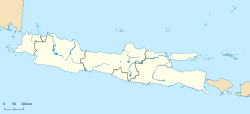Probolinggo
| |
|---|---|
| City of Probolinggo Kota Probolinggo | |
| Regional transcription(s) | |
| • Madurese | Prabâlingghâ (Latèn) ڤرابۤاليڠک࣭ۤا (Pèghu) ꦦꦿꦧꦭꦶꦁꦒ (Carakan) |
| • Javanese | Pråbålinggå (Gêdrig) ڤراباليڠڮا (Pégon) ꦥꦿꦧꦭꦶꦁꦒ (Hånåcåråkå) |
| • Chinese | 龐越 Pángyuè (Pinyin) Phâng-oa̍t (Hokkien POJ) |
| |
| Nicknames: Kota Anggur (City of Grapes), Bumi Banger (Land of the Banger), etc | |
| Motto(s): Tri Karsa Bina Praja (Developing the city by Three Means) | |
 Location within East Java | |
| Coordinates: 7°45′S 113°13′E / 7.750°S 113.217°E | |
| Country | |
| Region | Java |
| Province | |
| Settled | 4 September 1359[1] |
| Gementee | 1 July 1918[2] |
| Government | |
| • Mayor | Nurkholis (acting) |
| • Vice Mayor | Vacant |
| Area | |
• Total | 56.676 km2 (21.883 sq mi) |
| Elevation | 25 m (82 ft) |
| Population (mid 2023 estimate)[3] | |
• Total | 246,980 |
| • Rank | 51st |
| • Density | 4,400/km2 (11,000/sq mi) |
| Demonyms | Probolinggan Probolinggoan (id) Prabâlingghâ’ân (mad) Pråbålinggåan (jv) |
| Time zone | UTC+7 (IWST) |
| Postal code | 67211 – 67239 |
| Area code | (+62) 335 |
| Vehicle registration | N xxxx Q**/R*/S* |
| HDI (2023) | |
| Website | probolinggokota.go.id |




Probolinggo (Indonesian: Kota Probolinggo, Madurese: Kottha Prabâlingghâ, Javanese: Kuthå Pråbålinggå) is a city on the north coast of East Java province, Indonesia. It covers an area of 56.676 sq. km, and had a population of 217,062 at the 2010 census[4] and 239,649 at the 2020 census;[5] the official estimate as at mid 2023 was 246,980 (comprising 122,574 males and 124,406 females). [3] It is surrounded on the landward side by Probolinggo Regency of which it was formerly the capital, but it is now not part of the regency.
Like most of northern East Java, the city has a large Madurese population in addition to many ethnically Javanese people. It is located on one of the major highways across Java, and has a harbor that is heavily used by fishing vessels.
Under the Dutch East Indies colonial administration, especially in the 19th century, Probolinggo was a lucrative regional center for refining and exporting sugar, and sugar remains an important product of the area.
The city is famous for its mangoes, locally called mangga manalagi. Strong dry-season winds from July to September, the angin gending, help the mango trees pollinate and are sometimes credited with being the source of the area's quality fruit. The city formerly produced grapes as well, but few grapes are grown in the area now.
The motto of the city is Bestari which is an abbreviation of bersih (cleanliness), sehat (healthy), tertib (orderly), aman (safe), rapi (neat), and indah (beautiful).
- ^ Probolinggo, Kota. "Sejarah". portal.probolinggokota.go.id. Retrieved 2018-10-12.
- ^ "Sejarah Gemeente Probolinggo Dalam Museum - ANTARA News Jawa Timur". Antara News (in Indonesian). Retrieved 2018-10-12.
- ^ a b Badan Pusat Statistik, Jakarta, 28 February 2024, Kota Probolinggo Dalam Angka 2024 (Katalog-BPS 1102001.3574)
- ^ Biro Pusat Statistik, Jakarta, 2011.
- ^ Badan Pusat Statistik, Jakarta, 2021.






